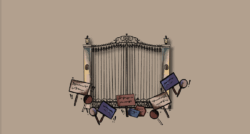Georgetown talks about “educating the whole person” a lot, and its professors have been known to complain that their students are more interested in earning high grades than they are in learning for learning’s sake. Considering this emphasis, it’s surprising that Georgetown has been slow to join the Free Culture movement, which encourages schools to make courseware like lectures accessible to anyone with access to the Internet and an eagerness for knowledge. Georgetown should be the next university to embrace Free Culture’s ideas about open courseware and open access publishing.
This summer, the University launched Georgetown OpenCourseWare, a website that would make learning materials like lectures from Georgetown classes accessible to anyone. So far, only eight classes are available on the site, including just one humanities course out of Georgetown’s vast humanities catalog. The paucity is partly due to the fact that OCW is a pilot program and partly because professors have concerns about putting their courses online, according to Kevin Donovan (SFS `11), the head of Georgetown’s chapter of Students for Free Culture.
Considering the benefits of open courseware, Georgetown’s reluctance is disheartening. Donovan points out that OCW can enhance professor’s reputations and name recognition, and takes very little time. Doctors and lawyers at small practices and firms can keep abreast of the latest developments in medical and legal research. With a prestigious law school and important medical research facilities, Georgetown can make significant contributions to these fields. On their part, more faculty ought to post videos of their classes on Georgetown OpenCourseWare.
Georgetown should also adopt an open access publishing mandate like the one the Massachusetts Insitute of Technology adopted in March. MIT’s mandate allows the university to freely disseminate its professors’ essays and studies, making scholarly articles available to individuals who likely could not otherwise afford to read them. A mandate like that at Georgetown should allow for exceptions so professors can continue to profit from the publication of some articles. If American institutions as a whole trend toward open access publishing, universities will need to spend less on scholarly journals. Journals sometimes charge its authors a fee, which universities will typically cover. This would impose a fee on Georgetown, but nothing like the money the University currently pays for scholarly journals, according to Donovan. In the 2008-2009 school year alone, Georgetown spent $4 million on journal subscriptions. That money could certainly be spent better elsewhere at the University.
With open courseware and open access publishing, Georgetown has a huge opportunity to enhance intellectual life outside its gates. It’s time that Georgetown walked the cura personalis talk.




